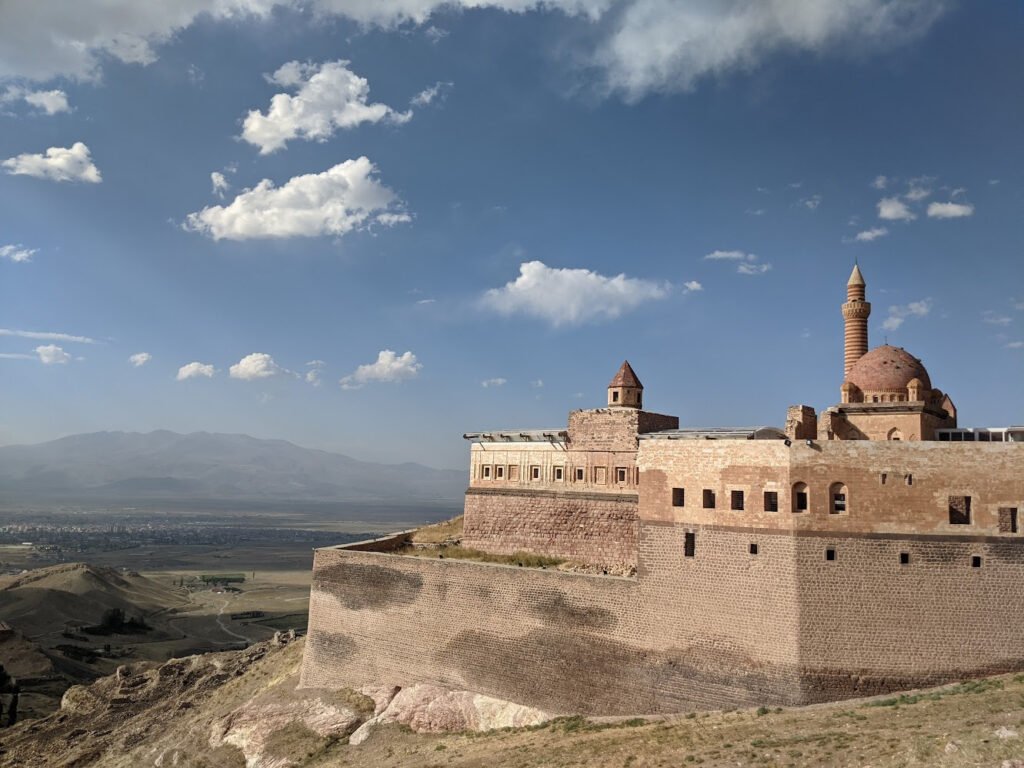Climbing Mt Ararat (Ağrı Dağı) – 5137m
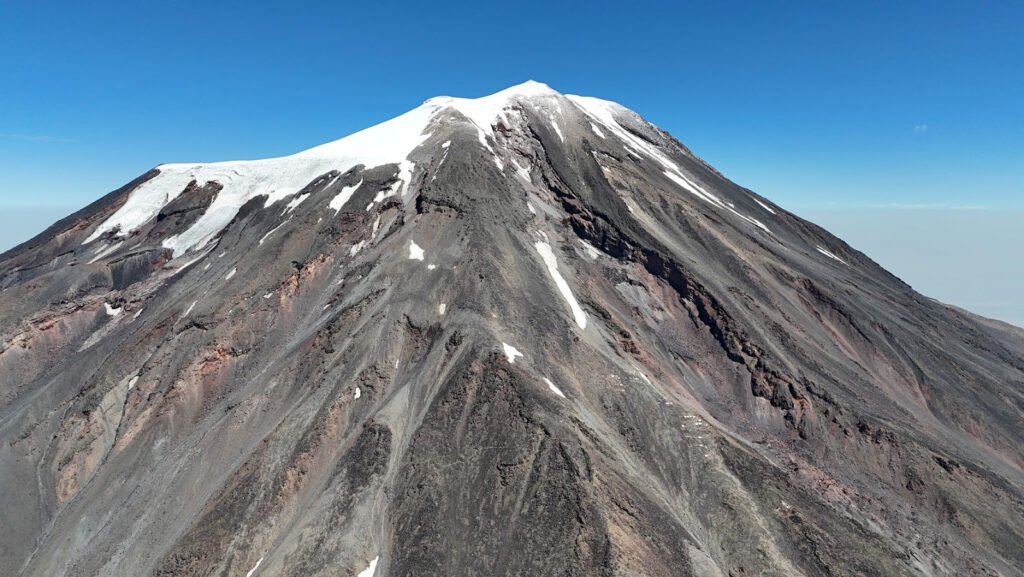
Mount Ararat is recognized as one of the most accessible peaks above 5000 meters, particularly when ascended during the “summer season.”Yet keep in mind that the easiest 5000m mountain is akin to the easiest marathon—something that still requires most people’s training and grit to complete.
We climbed Mt Ararat in early September 2024 as a sizable group of 17 people. For many, it was their first attempt to summit a mountain exceeding 5000 meters. 15 people got to the summit, one stayed in Camp 1, suffering from altitude sickness, and yet another developed HAPE (High Altitude Pulmonary Edema) complication from acute mountain sickness, required evacuation, and spent a few days in the hospital.
Day 1 – Van and Doğubayazıt
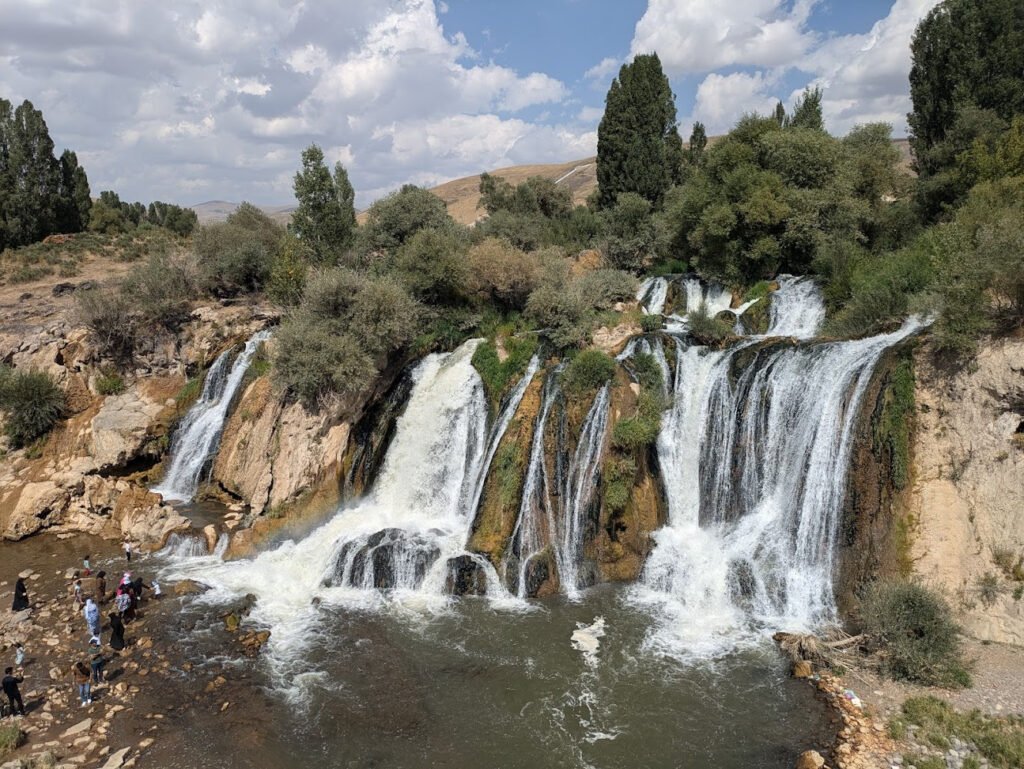
You can fly to multiple airports to climb Ararat – Igdir and Agri are the closest. I was with the part of our group that flew from Antalya, which had only direct flights to Van, the town with fascinating history, though a little further away (some 2h from Doğubayazıt).
If you have a chance you can arrive in Van a couple of days in advance to explore the surroundings, especially if you’re a fan of ancient history.
I did not have a chance to explore the town and surroundings, though. We got on the road directly from the airport. We stopped at Lake Van (the largest lake in Turkey) to take a swim, which was quite an interesting experience, as the water in the lake is so rich in minerals!
The second stop we made was Muradiye Şelalesi Falls, which was not what I imagined – it is a pretty crowded tourist trap right in the town. Can be a good stop to stretch your legs, get an ice cream, and a couple of photos, but nothing else.
One thing you notice while traveling is the heavy military presence – you pass through several block posts and see a lot of heavily armored vehicles on the roads – the fact you’re in the Kurdish territory and close to the border can be felt.
In the early afternoon, we arrived at Doğubayazıt (1650m) and checked into Tehran Boutique Hotel which was pretty simple but clean and comfortable.
While serving as the base for Ararat climbers Doğubayazıt is not a very touristic town. If you are interested in the real locals’ life rather than a tourist show, it is great to visit. There is a local market to hit, as well as plenty of tea houses and kebab shops. Locals are very friendly, and you should not be surprised if you’re invited by someone you see for the first time to join them for tea.
Day 2 – Trek to Camp 1 (3300m)
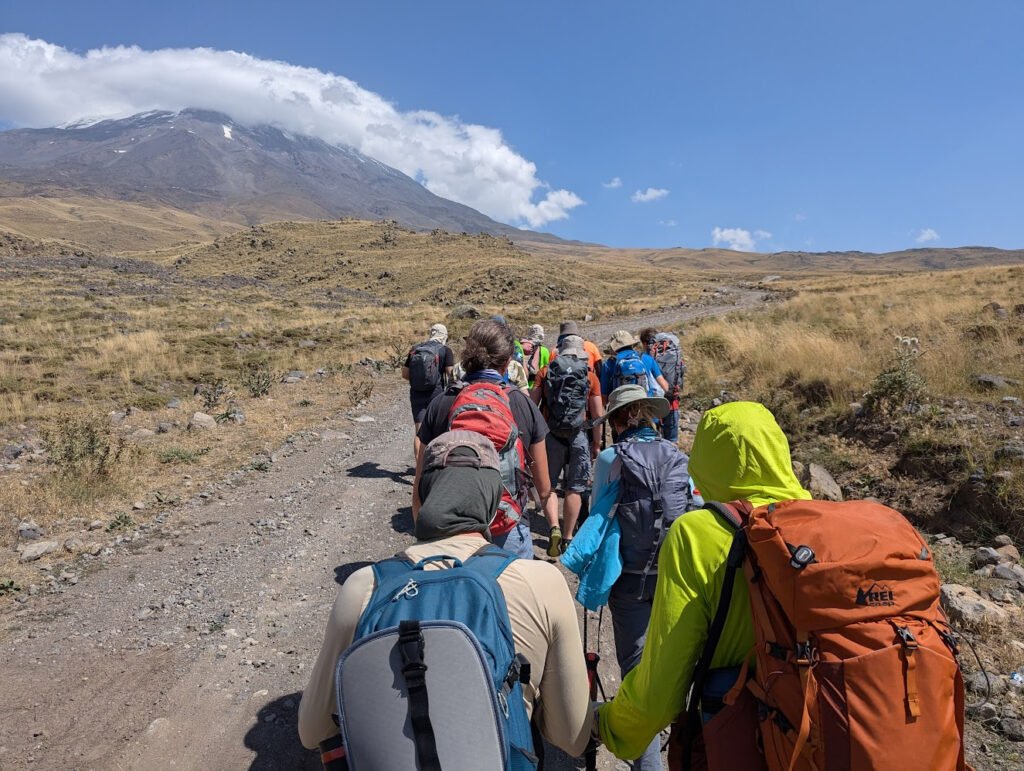
We store our “city luggage” at the hotel, load it into minivans, and leave for the mountain around 9:30 in the morning. It is about a one-hour drive and another 15 minutes on the block post, checking our permits as I can assume.
This day, and every day on the climb we were given “packed lunches” containing some juice drink, some local sweets for a snack, and a sandwich, which we could consume during the break as desired. There was enough proper food at camps so I left most of my “lunches” untouched.
Mini-buses drop us off at the Ararat foothills at around 2200m and we start our trek to Camp1 at 3300m. The trek is 7km long and takes our group around 4.5 hours at a leisurely pace. A section of the route follows an unpaved road that isn’t heavily trafficked, but the few cars that do pass by create bothersome clouds of dust… Other times the path takes a shortcut and goes by the dedicated trail, shared only with horses, which is much more pleasant.
The horses were also responsible for carrying our duffle bags all the way to Camp 2, so the only thing we needed to carry at all times was our daypack with the required clothes, water, and food for the day.
It is sunny so it is hot and good suncover and sunscreen are a must.
The Camp 1 sites are accessible by SUVs which means they are easy to supply, as well as making evacuation from them rather easy.
There are many camps, starting around 3000m, and ours was one of the furthest out. The camp was very comfortable with a dedicated kitchen gathering tent as well as many permanent framed tents with 1 or 2 elevated beds, a hot shower, and a toilet with running water.
At this time we were only a group at the camp which meant we did not need to share the facilities with anyone.
There was also a good cell phone connection, including LTE, as everywhere we were on the mountain. What was missing though was charging –
Upon arrival, we were served with tea and snacks and could rest until dinner time at 6:30 pm. Some of our group used this opportunity to take a nap while others explored the surroundings.
I am a big fan of the “hike high, sleep low” acclimatization method so I always take a chance to hike up 300-500m if the situation permits.
Day 3 – Acclimatization Hike to Camp 2 (4100m)
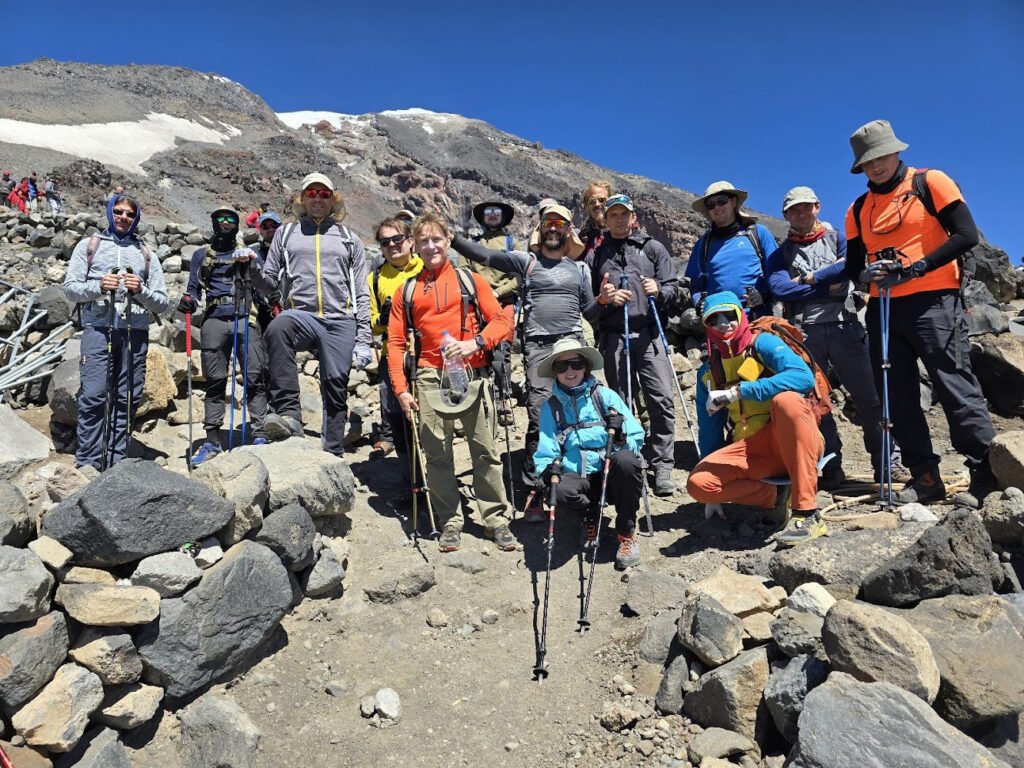
We wake up at 7; have breakfast and go on an acclimatization hike, taking the same trail as we take the next day to move to Camp 2. There is another (slightly steeper) trail to go to Camp 2, which I would have preferred we used for acclimatization to keep it more interesting.
The guides told us the hike up should take 3-4 hours – we did it in 2.5 (3.3km, 750m elevation gain) with everyone in the group moving pretty well. The trail from Camp 1 starts as rather flat but gets a lot steeper as you approach Camp 2, so it is a great test to see how the crew is handling steep terrain at altitude.
At Camp 2 we get some tea and snacks, take pictures and just hang out for a little bit less than 2 hours for acclimatization purposes, and then we head back to Camp 1 using the same route.
In the afternoon there is an opportunity to chill or hike around.
Day 4 – Moving to Camp 2 (4100m)
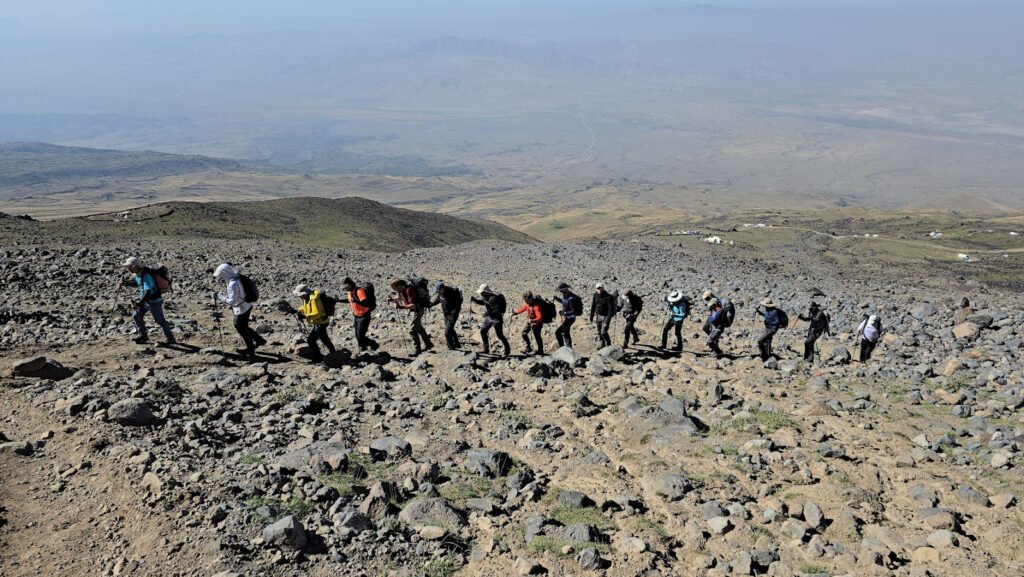
Today we’re moving to Camp 2, meaning all our stuff, not just the day pack needs packing. We pack our duffle bags and leave them for the horses before breakfast and then take a leisurely hike up. We are going even slower today.
One of the group members has been suffering from Altitude sickness and did not sleep well for the last two nights, so he decided to stay behind and wait for our return back at Camp 1.
Upon arrival at Camp 2, we settle into two large framed tents – 8 people per tent. Those who did not have their own crampons get them issued now. There is no snow or ice close to Camp 2, so there is really no opportunity to learn how to use crampons in real conditions. I would wish our guides to find a way to show the group some crampon usage basics as poor crampon technique can cause danger to yourself and your fellow climbers.
After getting the crampons and preparing gear for the night start some of the group took a nap, before an early dinner, others went to climb up a bit by the same trail we were to start during the night.
We got an early dinner around 5 pm and went off to bed to wake up around 12:30 am and start-up.
Day 5 – Summit Push
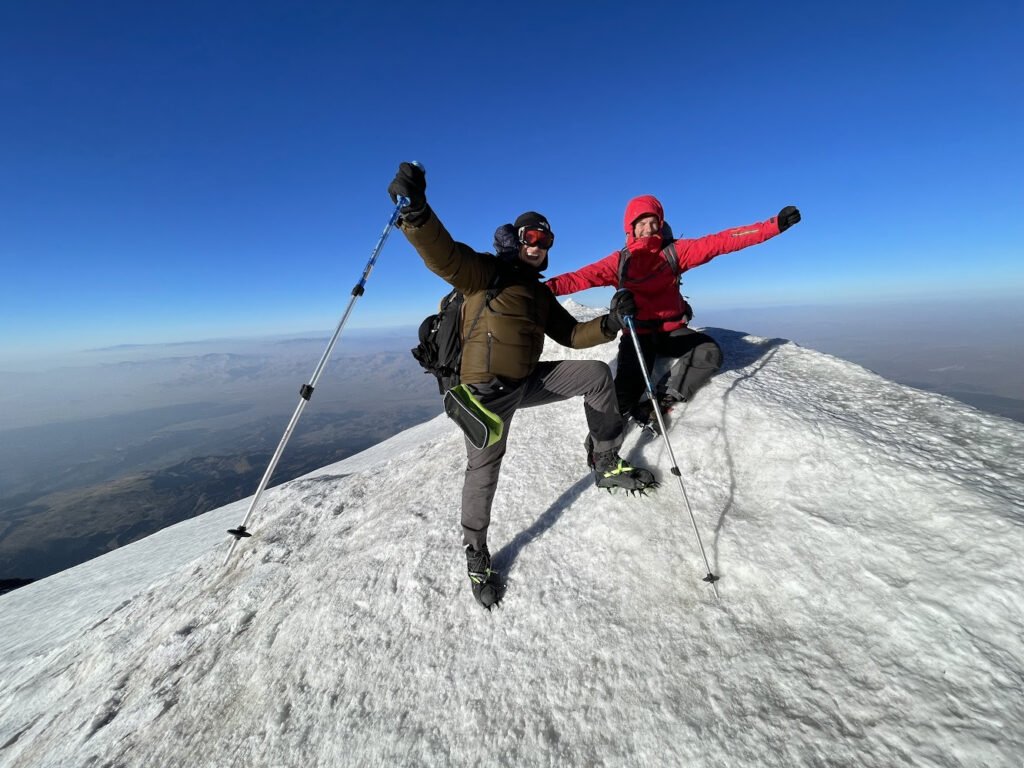
I was too pumped with adrenaline to sleep well, plus there was an altitude… others in the group had mixed success but because of the loud snoring at least some of us were able to sleep.
From the camp, we could see the lights of Doğubayazıt and many smaller towns and villages all around us, showing how close we are to civilization, and to the same extent how far.
As we had “breakfast” one more member decided he would not continue up because he did not feel well… this turned out to be a serious case of HAPE requiring evacuation, which I covered in detail in another article.
As we started up we moved at a very slow comfortable pace. I ended up having more layers than I usually would for conditions. The trail-up was pretty easy, with just a few moderately steep parts.
The forecast from Mountain Forecast was calling some 25km/h winds at the top and -1C. It ended up being a bit colder – some -4C as we were nearing 5000m. Stronger than expected wind made it even colder. I ended up putting my ski mask and balaclava to good use as well as warm mittens.
I had single-layer mountaineering boots on my feet which were doing quite well. Some people have even lighter footwear and I do not think anyone had a problem.
As we reached the glacier we stopped to put on crampons. It was in a rather windy and uncomfortable spot.
We indeed used crampons for a very short time and on rather non-technical terrain. Some other groups told us they only used crampons on the way down, but we ended up using them both ways.
On the summit, it was very windy, to the point you had to be careful with your backpack and poles as they were looking to fly away. We could even barely hear each other. So no drone shots or fun activities on the summit – we barely took a few pictures and hurried down the mountain.
All 15 folks who left Camp 2 made it to the summit, even without requiring us to split the group into faster and slower subgroups. I appreciate everyone who signed up for this expedition trained so well and also worked so hard during the summit push!
Descent to Camp 2 was quite uneventful and by 10 am we were back at the camp.
Dealing with the HAPE emergency and arranging for the evacuation messed up our plans a bit. Overall though we had a snack, took a brief rest, packed, and went down the mountain. Because our guides were tied up handling evacuation we went down on our own in small groups.
Overall, I made it to Camp 1 by 1 PM, and the rest of the group arrived within the next hour.
We chose to have an early dinner and go to bed early as it had been a long day after a sleepless night for most of us.
Start: 1:30 am; 7.6km roundtrip to summit around 8:30h; Took us about 5h to reach the summit; Total Ascent by GPS 1250m
Day 6 – Return to Doğubayazıt, Ishak Pasha Palace, Hamam
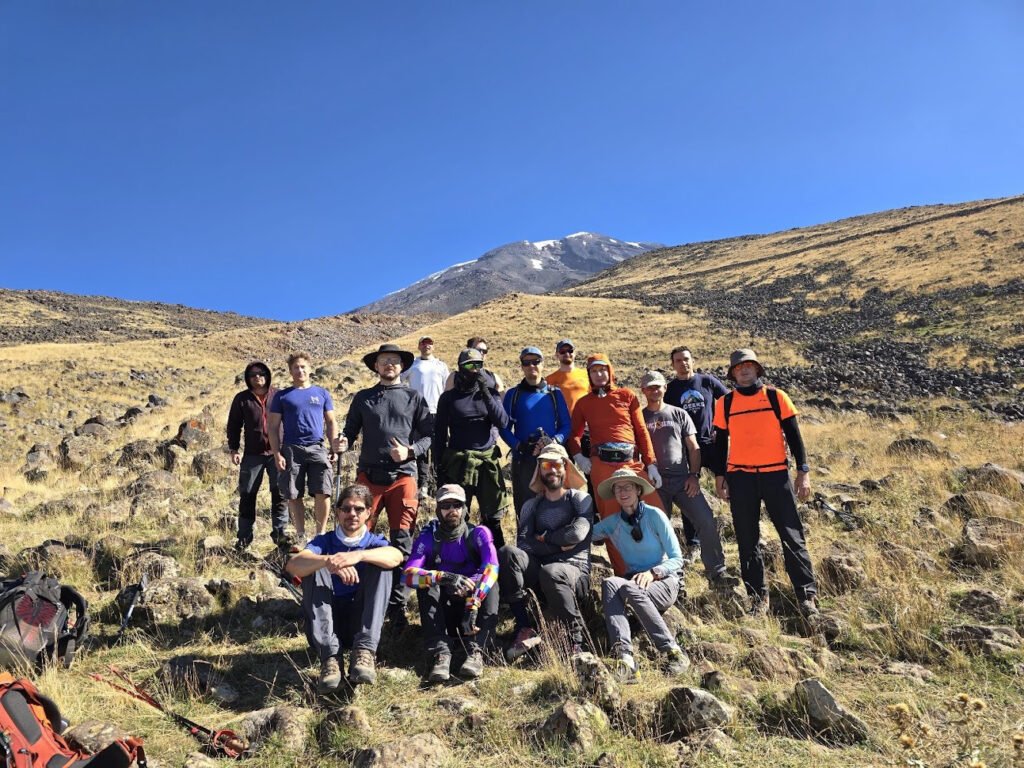
We chose to start early to reduce the amount of time we had to hike under the hot midday sun. Beautiful weather and lots of opportunities for pictures on the way down. It took us 2:30h to cover 7km and descend 1200m.
We arrived at the hotel by 11:30. Although not everyone could check into their rooms right away, we were able to leave our belongings at the hotel, grab some lunch, and then set off for Ishak Pasha Palace by 2 pm—one of the best-preserved palaces of its kind.
From the plaza by Ishak Pasha Palace, you can see the ruins of an old huge Urarian Castle almost 3000 years old. I would wish we had time to explore those as they look very interesting and not developed at all.
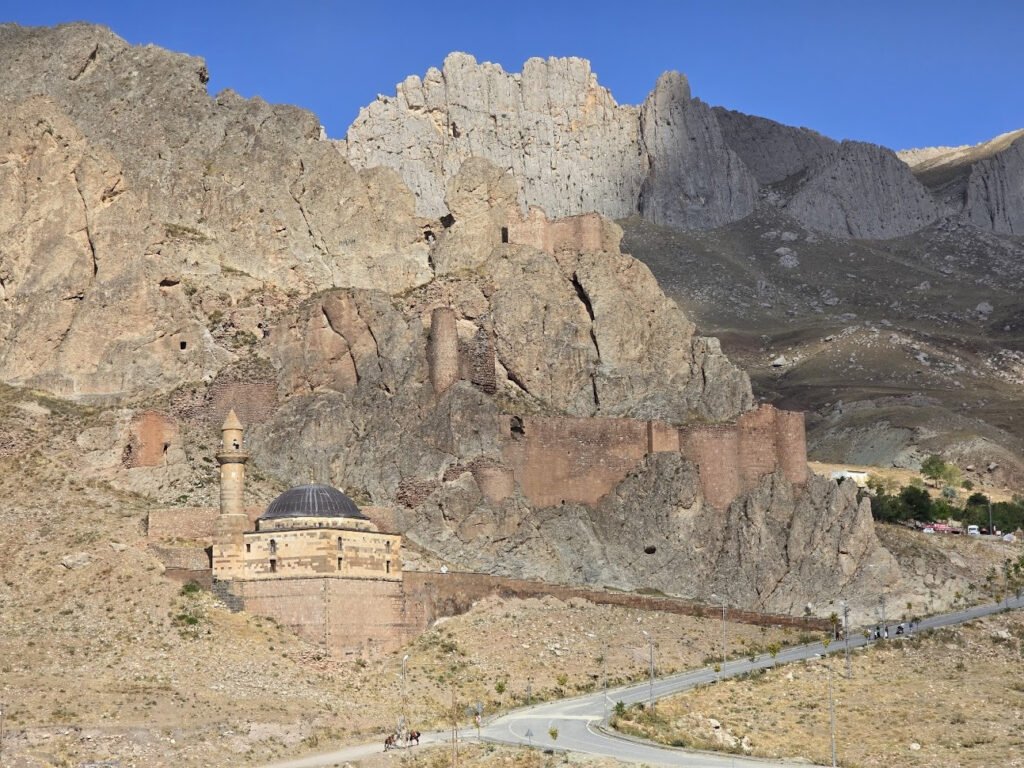
Ishak Pasha’s Palace has most of its walls in good condition, but the lack of artifacts from its era makes it less captivating. A visit of about one to one and a half hours is sufficient to explore the site.
We return to the hotel, everyone gets their room and after an hour or so we go to the local Hamam (Turkish Bath) – a short walking distance from the hotel.
The hamam we attended was set in the local apartment building and looked like a place where locals would go, rather than something focused on serving tourists. The surprising thing was that they had provided swim trunks for rent for those who thought they were going to the mountains, and so did not need one.
We could enjoy a swimming pool, a dry and wet sauna, and a rather unusual form of massage, where soap is used instead of oil. It was a good way to clean up after a few days in the mountains.
We ended the day with dinner at a local restaurant, indulging in more kebabs and saying our goodbyes, as some folks were leaving very early the next morning.
Day 7 – Departure Day
The groups of us were picked up and taken to the airport for our departure. Most of us were going to Istanbul from Igdir.
Just before the time to leave for the airport, we got a notification our plane was going to be delayed. I thought it was not a problem as we would just have more time to have lunch at the airport. Rookie mistake! Igdir airport is actually located in the middle of nowhere and it is a very small airport without any decent food options – the “best” food you could get from that snack bar was a very basic ham and cheese sandwich.
Considering we had plenty of time, a better option would have been to stop somewhere for lunch.
At Istanbul airport, another surprise awaited us. While the Uber application suggested a couple of convenient pickup spots, that was not the reality. Instead, the Uber driver navigated us to locations outside of the airport territory—about 15 minutes away—through a series of messages. If I had known, I would have taken a cab instead, which was readily available right by the exit door.
Summary
Overall, it was a fantastic experience. We appreciated the beauty and challenge of Ararat, as well as the opportunity to make new friends and reconnect with old ones. I wish we hadn’t had to deal with the HAPE emergency during the trip, and there were some logistical issues that could have been avoided. However, I believe Ararat is a great mountain for anyone looking to climb a 5,000m+ peak or seeking a fun and unique corporate team-building event.
This event was organized as part of the GeeksGoPeeks project. Interested to join us for one of the future trips? Please sign up!

